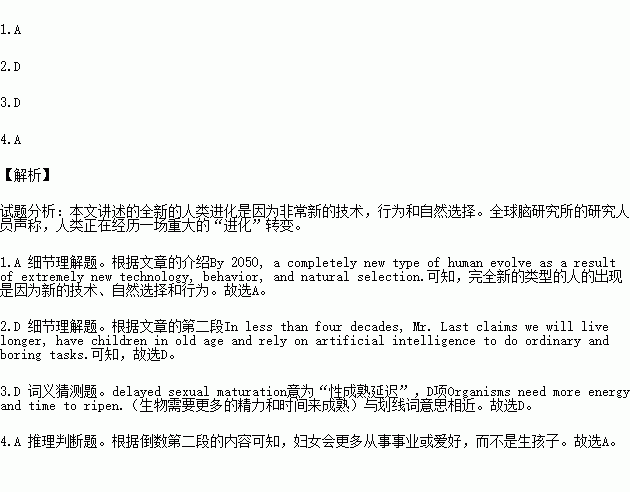题目内容
By 2050, a completely new type of human evolve as a result of extremely new technology, behavior, and natural selection. This is according to Cadell Last, a researcher at the Global Brain Institute, who claims mankind is undergoing a major “evolutionary transition”.
In less than four decades, Mr. Last claims we will live longer, have children in old age and rely on artificial intelligence to do ordinary and boring tasks. This shift is so significant, he claims, it is comparable to the change from monkeys to apes, and apes to humans. “Your 80 or 100 is going to be so radically different than your grandparents,” Mr. Last says, who believes we will spend much of our time living in virtual reality. Some evolutionary scientists believe this age could be as high as 120 by 2050.
Mr. Last claims humans will also demonstrate delayed sexual maturation, according to a report by Christina Sterbenz in Business Insider. This refers to something known as life history theory which attempts to explain how natural selection shapes key events in a creature’s life, such as reproduction. It suggests that as brain sizes increase, organisms need more energy and time to reach their full potential, and so reproduce less.
Instead of living fast and dying younger, Mr. Last believes humans will live slow and die old. “Global society at the moment is a complete mess,” he told MailOnline. “But in crisis there is opportunity, and in apocalypse (启示) there can be transformation. So I think the next system humanity creates will be far more sophisticated, fair, and abundant than our current civilization.”
“I think our next system will be as different from the modern world, as our contemporary world is from the medieval (中世纪的) world. The biological clock isn't going to be around forever,” he added, and said that people could pause it for some time using future technology.
The change is already happening. Today, the average age at which a woman in Britain has her first baby has been rising steadily stands at 29. 8. In the US, just one percent of first children were born to women over the age of 35 in 1970. By 2012, that figure rose to 15 percent.
“As countries become socio-economically advanced, more and more people, especially women have the option to engage in cultural reproduction,” Mr. Last added. And as well as having more child-free years to enjoy leisure time, he believes artificial intelligence will make up the need for low-skill jobs. We may also spend a large amount of time living in virtual reality. “I’m not quite sure most people have really absorbed the implications of this possibility,” Mr. Last said.
His views are detailed in a paper, titled “Human Evolution, Life History Theory, and the End of Biological Reproduction" published Current Aging Science.
1.According to Cadell Last, a completely new type of human will appear because of ________.
① artificial intelligence ② new technology ③ natural selection ④ mundane tasks ⑤ behavior
A. ②③⑤ B. ①②③ C. ③④⑤ D. ①②⑤
2.Which statement is compared by Mr. Last to the change from monkeys to apes, and apes to humans?
A. We have diseases and die young.
B. We spend less time in virtual reality.
C. We give birth to a child when we are young.
D. We use intelligent robots to do everyday housework.
3.The underlined words in the third paragraph most probably mean “________”.
A. Reproduction.
B. Reproduce less.
C. Natural selection shapes key events.
D. Organisms need more energy and time to ripen.
4.In the next system Mr. Last explained we can infer that ________.
A. women are engaged in careers or hobbies instead of giving birth to babies
B. women are engaged in playing computer games rather than working
C. women are engaged in cultural reproduction in place of men
D. women are engaged in living in virtual reality without options
 开心蛙状元测试卷系列答案
开心蛙状元测试卷系列答案
